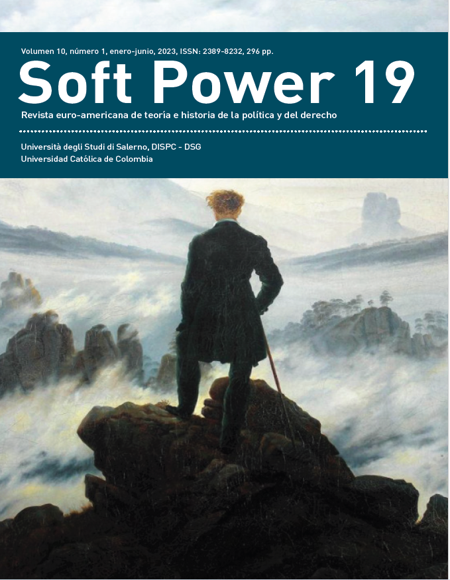
Esta obra está bajo una licencia internacional Creative Commons Atribución-NoComercial 4.0.
Al enviar los artículos para su evaluación, los autores aceptan que transfieren los derechos de publicación a Soft Power. Revista Soft Power para su publicación en cualquier medio. Con el fin de aumentar su visibilidad, los documentos se envían a bases de datos y sistemas de indización, así mismo pueden ser consultados en la página web de la Revista.Resumen
El objetivo de este artículo es mostrar algunos puntos teóricos en los que Sloterdijk y Latour se influyeron mutuamente. Las secciones 1 y 2 están dedicadas a la influencia de Latour en Sloterdijk, particularmente en la formulación del concepto de antropotecnia y en el intento de superar las dicotomías naturaleza/cultura y sujeto/objeto. El párrafo 3 está dedicado a la crítica de Sloterdijk al concepto de red y a la respuesta de Latour a esta crítica. Los párrafos 4 y 5 están dedicados a la influencia de Sloterdijk en Latour: en particular, el uso que hace Latour del concepto sloterdijkiano de “Globo” y la filosofía del medio ambiente de Sloterdijk, interpretada por Latour como una filosofía del diseño.
Palabras clave

Citas
Han, B.-C. (2022). Non-things: Upheaval in the Lifeworld. Polity.
Heidegger, M. (1977). The Question Concerning Technology. In The Question Concerning
Technology and Other Essays (3-35). Garland
Heidegger, M. (1995). The Fundamental Concepts of Metaphysics. World, Finitude, Solitude.
Indiana University Press.
Latour, B. & S. Woolgar (1986). Laboratory Life. The Construction of Scientific Facts.
Princeton University Press.
Latour, B. (1993). We Have Never Been Modern. Cambridge (MA). Harvard University
Press.
Latour, B. (2009). Spheres and Networks: Two Ways to Reinterpret Globalization. Harvard
Design Magazine 30 (1) 2009. Retrieved from https://www.harvarddesignmagazine.
org/issues/30
Latour, B. (2011). A Cautious Prometheus? A Few Steps Toward a Philosophy of Design
(with Special Attention to Peter Sloterdijk). In W. Schinkel & E. Noordegraaf-
Eelens
(Eds.), In Medias Res. Peter Sloterdijk’s Spherological Poetics of Being (151-164). Amsterdam
University Press.
Latour, B. (2016). Onus Orbis Terrarum: About a Possible Shift in the Definition of Sovereignty.
In Millennium: Journal of International Studies, 44 (3), 305-320.
Latour, B. (2017). The Anthropocene and the destruction of (the image of) the Globe. In
Facing Gaia. Eight Lectures on the New Climatic Regime (111-145). Polity.
Lucci, A. (2011). Il limite delle sfere. Saggio su Peter Sloterdijk. Bulzoni.
Lucci, A. (2021). The Limits of the Spheres: Otherness and Solipsism in Peter Sloterdijk’s
Philosophy. Angelaki. Journal of the Theoretical Humanities, 26 (1), 92-108.
Nietzsche, F. (1964). The Gay Science. Random House.
Sloterdijk, P. (2012). Zeilen und Tage. Notizen 2008-2011. Suhrkamp.
Sloterdijk, P. (2013a). You Must Change Your Life. On Anthropotechnics. Semiotext(e).
Sloterdijk, P. (2013b). In the World Interior of Capital. For a Philosophical Theory of Globalization.
Polity.
Sloterdijk, P. (2016). Spheres. Volume 3: Foams. Plural Spherology. Semiotext(e).
Sloterdijk, P. (2017a). The Domestication of Being. The Clarification of the Clearing. In
Not Saved. Essays after Heidegger (89-148). Polity.
Sloterdijk, P. (2017b). Rules for the Human Park. A Response to Heidegger’s “Letter
on ‘Humanism’”. In Not Saved. Essays after Heidegger (193-216). Polity.
Sunderland, T. (2019). Peter Sloterdijk and the “Security Architecture of Existence”:
Immunity, Autochthony, and Ontological Negativism. Theory, Culture & Society, 36
(7/8): 193-214. Web. doi:10.1177/0263276419839119










